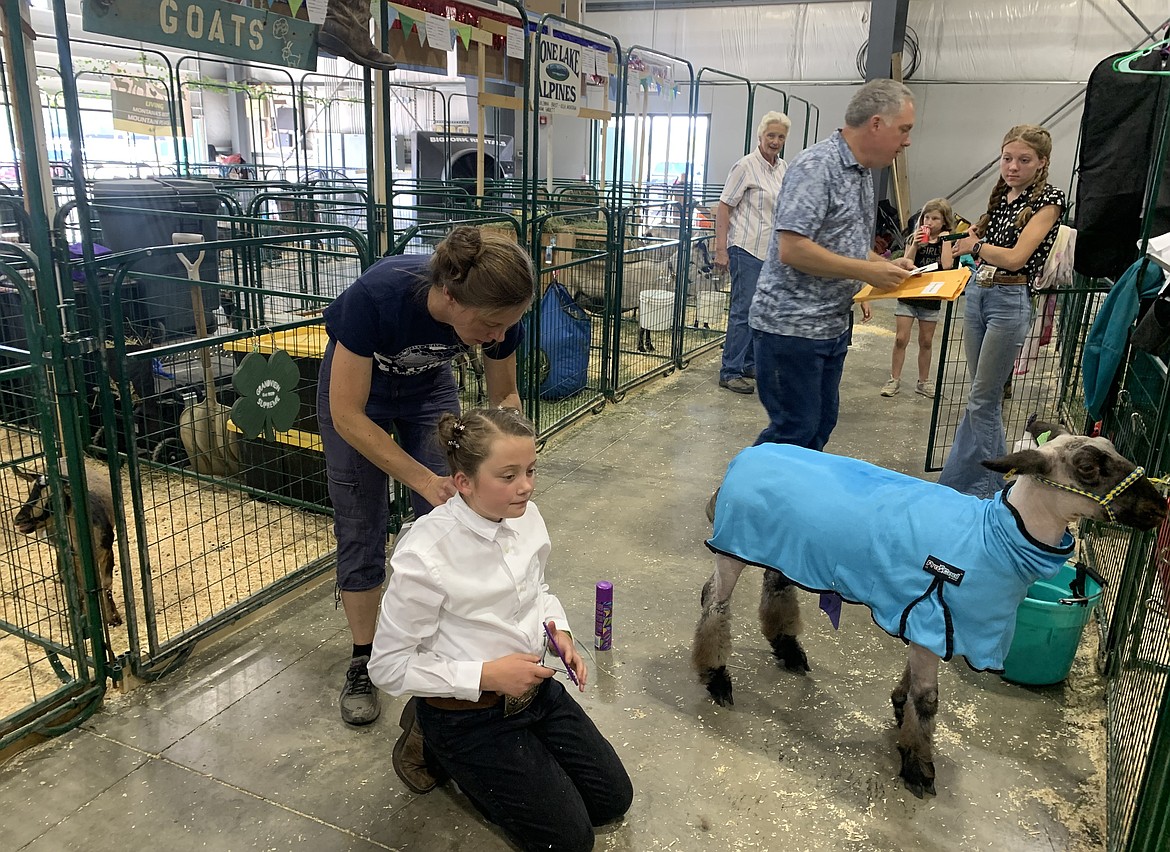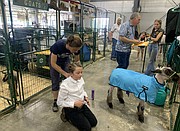In all sheeps and sizes — 4-H and FFA members compete in sheep show at the fair
HILARY MATHESON | Hagadone News Network | UPDATED 2 years, 4 months AGO
The Brist children of Lone Lake Farm are continuing a legacy of raising and showing livestock.
The Brists, which includes father Rob, mother Tess and children Madison, Emma, Naomi and Garrett, were showing sheep, goats and cows during the Northwest Montana Fair this week.
“In 1918, my great-grandfather bought the farm from a homesteader,” said Rob, who also showed livestock as a 4-Her and as a Flathead High School FFA member.
On Tuesday afternoon in the Trade Show building, Emma, Naomi and Garrett Brist were preparing to show their Hampshire/Suffolk sheep Bubbles, Waldo and Scooby.
Rob, Tess and Madison were on hand to help and watch the sheep while the children left to change into their show clothes — which for 4-Hers is a crisp, white long-sleeved button-down shirt and black jeans. Returning, Naomi rakes a fluffer comb into the lone patch of wool on her sheep’s lower legs. Handing it over to Emma, Tess pinned No. 229 to the back of her shirt. The two sisters, who were going head-to-head in the junior division, gave final spritzes of conditioning polish spray over their sheep before entering the ring.
This is the fourth year Naomi has shown sheep and was excited to see the market scores.
“Sheep are easier to raise than cattle,” she said.
But one thing the children discovered this year is their susceptibility to diseases, such as fungus, Tess said.
“When you shear them down, you’re taking away the lanolin that protects their skin and you’re frequently washing them,” Tess said.
Another consideration Garrett said in showing sheep is maintaining their weight and muscle mass, which he does through measuring the amount of feed they eat and walking them on the treadmill — or what the Brists have dubbed the “shredmill” Tess said smiling.
“This guy gains weight really easily,” Naomi said, pointing to Waldo.
Getting livestock in top form requires a lot of work by the 4-H and FFA members who start carefully tending to their animals in the spring when sheep are typically purchased. Garrett, who stood up after hugging his sheep tightly, said he and his siblings wake up early to feed and water them and after school, it’s back to the same. On top of that, showing an animal requires regular handling to get the animals used to being touched and led around the show ring.
“They get such a bond with their animals,” Tess said. “For me I grew up playing volleyball so it was a whole new world, but I love it because these kids learn about responsibility. They’re learning about how to manage their money. They’re using money from the previous year’s [market] sale to pay for their project and so they’ve got to think about how many bags of feed do I need? How much hay and do I want extras like the coats and leg wraps and supplements?”
Once 2 p.m. rolls around, the children gather to watch the tail end of the senior division before it’s their turn to enter the show ring. Madison, who was showing cows in the senior division this year, gave her sisters a quick tip that judge Mari Morris was looking for competitors who moved naturally and with ease in working their sheep in the ring.
“Showmanship is about how you present yourself and your animal, but in market it’s all about your animal,” Emma said.
In the show ring one of the important stances is called bracing where competitors stand in front of their sheep and brace against them in a lunge, cupping the animal’s heads upward.
“You push, they have to respond,” Emma said.
After Emma and Naomi finish competing in two separate classes of the junior division, the judge selects Emma to advance for the final round.
When announcing the grand champion, Mari remarks on the trickiness of making showing sheep look fluid and natural, which is how she determined the competitors that “rose to the top,” in poise and professionalism. Over the loudspeaker, Halsey Middlemist’s name was heard as the grand champion.
“This young lady the only phrase that comes to mind when I watch her show is though she'd be but little she's mighty or fierce, you know, whichever word you want to put in there because she just gets the job done flat good. I mean, I have such a hard time picking any sort of holes in her. I just love watching her show,” Mari said. “So congratulations, young lady. Excellent, excellent work.”
She used the same phrase of “little but mighty” to describe reserve champion Bodie Rudiger.
“That lamb probably weighs double what he does. He's mighty and he handled himself so well. When I watch him he makes it look like he's having to use every ounce of his strength in his body to control that thing,” she said.
In third place was Emma, who Mari said should feel honored and proud of her placement, advising her to retain some of the intensity she showed, but smooth out her transitions as she worked her sheep around the ring.
“You did a really good job,” Mari said.
Walking over to her mother and father, Emma was met with congratulations.
“It’s a sense of pride to see my children learning agriculture and working the same fields and the same types of animals that their ancestors did,” Rob said. “There’s no limit to what children can learn from agriculture.”
Hilary Matheson may be reached at 758-4431 or [email protected].
ARTICLES BY HILARY MATHESON

Christmas tradition: Business continues helping customers capture the holiday spirit
Snowline Acres owners Tom and Kristin Davis are approaching a decade of helping people celebrate the most wonderful time of the year.
Whitefish High School wins East Helena speech and debate tournament
Scoring 225 points, the Whitefish High School speech and debate team took first place at a weekend tournament.

Glacier High speech and debate team secures second in Bozeman
The Glacier High School speech and debate team secured second place, and Flathead High School, third in Bozeman.





